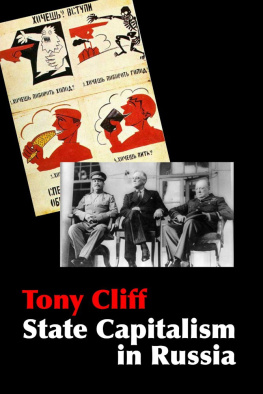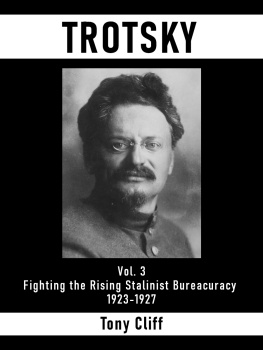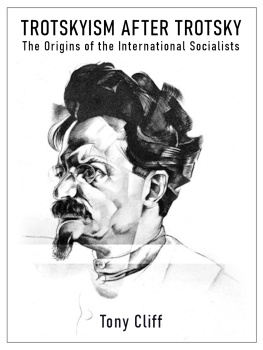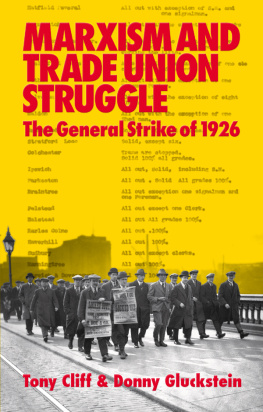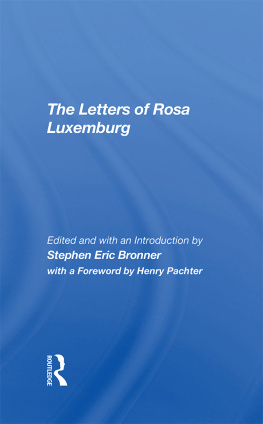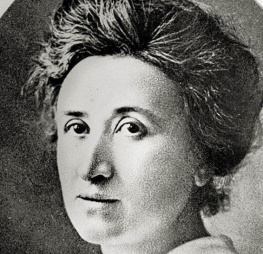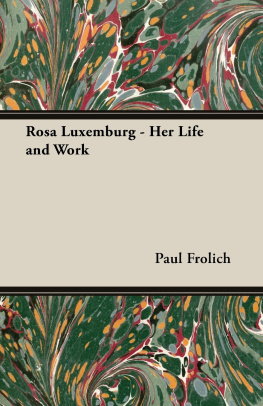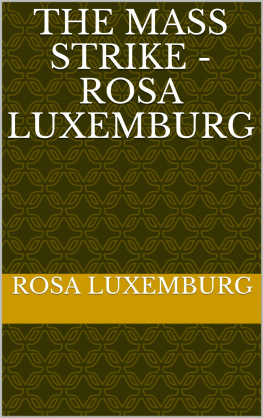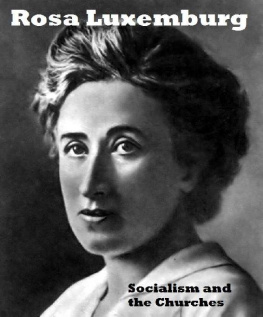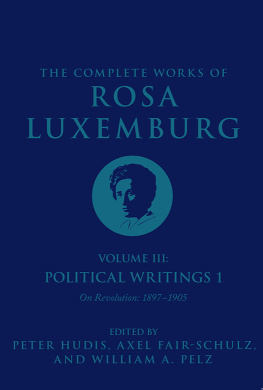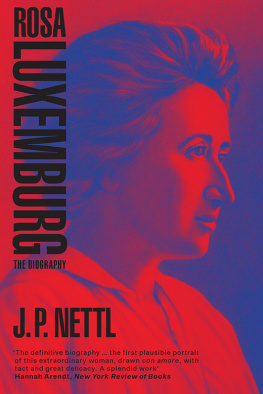Tony Cliff - Rosa Luxemburg
Here you can read online Tony Cliff - Rosa Luxemburg full text of the book (entire story) in english for free. Download pdf and epub, get meaning, cover and reviews about this ebook. year: 2020, publisher: Marxists Internet Archive, genre: Politics. Description of the work, (preface) as well as reviews are available. Best literature library LitArk.com created for fans of good reading and offers a wide selection of genres:
Romance novel
Science fiction
Adventure
Detective
Science
History
Home and family
Prose
Art
Politics
Computer
Non-fiction
Religion
Business
Children
Humor
Choose a favorite category and find really read worthwhile books. Enjoy immersion in the world of imagination, feel the emotions of the characters or learn something new for yourself, make an fascinating discovery.
- Book:Rosa Luxemburg
- Author:
- Publisher:Marxists Internet Archive
- Genre:
- Year:2020
- Rating:4 / 5
- Favourites:Add to favourites
- Your mark:
- 80
- 1
- 2
- 3
- 4
- 5
Rosa Luxemburg: summary, description and annotation
We offer to read an annotation, description, summary or preface (depends on what the author of the book "Rosa Luxemburg" wrote himself). If you haven't found the necessary information about the book — write in the comments, we will try to find it.
Rosa Luxemburg — read online for free the complete book (whole text) full work
Below is the text of the book, divided by pages. System saving the place of the last page read, allows you to conveniently read the book "Rosa Luxemburg" online for free, without having to search again every time where you left off. Put a bookmark, and you can go to the page where you finished reading at any time.
Font size:
Interval:
Bookmark:
2nd edition
Socialist Review Publishing
London, 1969
First published as a pamphlet in 1959 (reprinted 1968)
Revised edition 1969 (reprinted 1980)
Transcribed by Artroom, East End Offset (TU), London
Marked up by Einde OCallaghan for the Marxists Internet Archive
Converted to ebook format June 2020
Cover photograph: Luxemburg, Berlin c.1910
Wikimedia Commons
At the time of ebook conversion this work was available in hardcopy:
Reprinted in Tony Cliff, International Struggle and the Marxist Tradition
Selected Works, vol.1., Bookmarks, London 2001, pp. 59116
https://bookmarksbookshop.co.uk/
Rosa Luxemburg was first published in 1959. When it was reissued in 1969, Cliff made two small but significant changes. These reflected the way he had revised his position on Leninism and the revolutionary party in the light of the French events of 1968 and the debate on democratic centralism in the International Socialists in the same year. These changes occur on pp.45-46 of the 1980 edition and pp.85-86 of this edition.
Rosa Luxemburgs reluctance to form an independent revolutionary party is quite often cited by Stalinists as a grave error and an important cause for the defeat of the German Revolution in 1918. They argue that Lenin was opposed to the revolutionary Lefts adherence to the SPD and continuing association with Kautsky.
There is no truth at all in this legend. Actually, Rosa Luxemburg made a clearer assessment of Kautsky and Co, and broke with them long before Lenin did.
Rosa Luxemburgs reluctance to form an independent revolutionary party followed her slowness to react to changed circumstances. It was a central factor in the belatedness of building a revolutionary party in Germany. In this, however, she was not alone. Lenin was no quicker to break with Kautsky than Rosa. There is no ground to the Stalinist story according to which Lenin was opposed to the revolutionary Lefts adherence to the SPD and continuing association with Kautsky. Actually, Rosa Luxemburg made a clearer assessment of Kautsky and Co, and broke with them long before Lenin did.
For Marxists, in advanced industrial countries, Lenins original position can serve much less as a guide than Rosa Luxemburgs, notwithstanding her overstatements on the question of spontaneity.
However, whatever the historical circumstances moulding Rosas thought regarding organisation, these thoughts showed a great weakness in the German Revolution of 1918-19.
This note appears in Tony Cliff, International Struggle and the Marxist Tradition, Selected Works, vol.1, Bookmarks, London 2001, p.113. In the Marxists Internet Archive we have archived the two editions separately according to the year of publication, 1959 or 1969.
On 15 January 1919 a soldiers rifle butt smashed the skull of Rosa Luxemburg, revolutionary genius, fighter and thinker. A personification of the unity of theory and practice, Rosa Luxemburgs life and work require a description of her activities as well as her thoughts they are inseparable. In the framework of a pamphlet, however, one cannot hope to do justice to both. In trying to avoid falling between two stools, this pamphlet concentrates mainly on Rosa Luxemburgs ideas, as they contain her main permanent contribution to the international socialist movement.
Little of her writing has been translated into English. It is, therefore, useful to give as varied a selection from her work (largely translated from the original German) as possible.
A scientific socialist, whose motto was doubt all, Rosa Luxemburg could have wished for nothing better than a critical evaluation of her own work. The present essay is written in a spirit of admiration and criticism of its subject.
Rosa Luxemburg was born in the small Polish town of Zamosc on 5 March 1871. From early youth she was active in the socialist movement. She joined a revolutionary party called Proletariat, founded in 1882, some 21 years before the Russian Social Democratic Party (Bolsheviks and Mensheviks) came into being. From the beginning Proletariat was, in principles and programme, many steps ahead of the revolutionary movement in Russia. While the Russian revolutionary movement was still restricted to acts of individual terrorism carried out by a few heroic intellectuals, Proletariat was organising and leading thousands of workers on strike. In 1886, however, Proletariat was practically decapitated by the execution of four of its leaders, the imprisonment of 23 others for long terms of hard labour, and the banishment of about 200 more. Only small circles were saved from the wreck, and it was one of these that Rosa Luxemburg joined at the age of 16. By 1889 the police had caught up with her, and she had to leave Poland, her comrades thinking she could do more useful work abroad than in prison. She went to Switzerland, to Zurich, which was the most important centre of Polish and Russian emigration. There she entered the university where she studied natural sciences, mathematics and economics. She took an active part in the local labour movement and in the intense intellectual life of the revolutionary emigrants.
Hardly more than a couple of years later Rosa Luxemburg was already recognised as the theoretical leader of the revolutionary socialist party of Poland. She became the main contributor to the party paper, Sprawa Rabotnicza, published in Paris. In 1894 the name of the party, Proletariat, was changed to become the Social Democratic Party of the Kingdom of Poland; shortly afterwards Lithuania was added to the title. Rosa continued to be the theoretical leader of the party (the SDKPL) till the end of her life.
In August 1893 she represented the party at the Congress of the Socialist International. There, a young woman of 22, she had to contend with well-known veterans of another Polish party, the Polish Socialist Party (PPS), whose main plank was the independence of Poland and which claimed the recognition of all the experienced elders of international socialism. Support for the national movement in Poland had the weight of long tradition behind it: Marx and Engels, too, had made it an important plank in their policies. Undaunted by all this, Rosa Luxemburg struck out at the PPS, accusing it of clear nationalistic tendencies and a proneness to diverting the workers from the path of class struggle; and she dared to take a different position to the old masters and oppose the slogan of independence for Poland. (For elaboration on this, see Rosa Luxemburg and the National Question below.) Her adversaries heaped abuse on her, some of them, like the veteran disciple and friend of Marx and Engels, Wilhelm Liebknecht, going so far as to accuse her of being an agent of the Tsarist secret police. But she stuck to her point.
Intellectually she grew by leaps and bounds. She was drawn irresistibly to the centre of the international labour movement, Germany, where she made her way in 1898.
She started writing assiduously, and after a time became one of the main contributors to the most important Marxist theoretical journal of the time, Die Neue Zeit. Invariably independent in judgment and criticism, even the tremendous prestige of Karl Kautsky, its editor, the Pope of Marxism as he used to be called, did not deflect her from her considered opinions once she had become convinced.
Rosa Luxemburg entered heart and soul into the labour movement in Germany. She was a regular contributor to a number of socialist papers in some cases their editor she addressed many mass meetings and took part energetically in all the tasks the movement called upon her to perform. Throughout, her speeches and articles were original creative works, in which she appealed to reason rather than emotion, and in which she always opened up to her readers a wider and grander horizon than they had known before.
Font size:
Interval:
Bookmark:
Similar books «Rosa Luxemburg»
Look at similar books to Rosa Luxemburg. We have selected literature similar in name and meaning in the hope of providing readers with more options to find new, interesting, not yet read works.
Discussion, reviews of the book Rosa Luxemburg and just readers' own opinions. Leave your comments, write what you think about the work, its meaning or the main characters. Specify what exactly you liked and what you didn't like, and why you think so.



